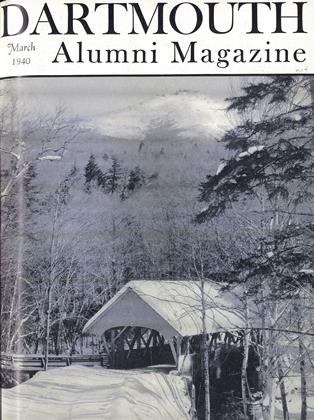IT WAS FORD SAYRE'S IDEA, at least in its application to Hanover. He got it from North Conway, Jackson and other Eastern Slopes towns, where for a year or two the service clubs have annually outfitted underprivileged children with skis and ski equipment free of charge. This year, financed by the Inter fraternity Council, at least 19 of Hanover's impecunious but accomplished kid-skiers will be given a pair of skis, boots, bindings and poles, and will receive free instruction through the good offices of the Hanover Inn.
The idea as developed in towns north of Hanover is to provide the equipment for all kids who need it but can't afford it. It is theirs to use through the winter, but they must return it in the spring. They can't sell it; but when it is outgrown or damaged they receive new equipment in its place. Thus, a pair of skis used for a season or two by one boy may be repaired and issued to another whom it fits. This is Hanover's plan, too.
When the idea was' brought before the Inter fraternity Council in December that body decided forthwith to sponsor it, and some $170 was raised within the Dartmouth fraternities to pay the initial cost of equipment. Provided at cost by the Dartmouth Co-op, the skis will be given to Hanover children through individual selection by Robert J. Fuller, superintendent of schools.
Maybe this seems a curious charity. But in every New England town there are kids who may have enough to eat, whose homes may be warm and whose clothes may be adequate, but whose play hours are drab and disappointing compared with those of the more fortunate element. Kids need more than clothes and oatmeal: they need fun—the joy of sport—something to do that gives pleasure, skill and spiritual satisfaction. This is what the free ski idea aims to accomplish.
It's working, too. A lot of children are stemming, turning, schussing and whatnot all over Hanover's hillsides—getting a thrill out of life outside of school hours— because of Ford Sayre's initiative, John Piane's and Mr. Fuller's fine cooperation, and the fraternities' generosity.
NEWLY OUTFITTED YOUNG SKIERS EXAMINE THEIR EQUIPMENT; PEGGY SAYRE LOOKS ON
 View Full Issue
View Full Issue
More From This Issue
-
 Article
ArticleEducation At Its Best
March 1940 By ARTHUR DEWING '25 -
 Sports
SportsBig Green Teams
March 1940 By Whitey Fuller '37 -
 Article
ArticleAn Obligation to Alumni
March 1940 By BEN AMES WILLIAMS '10 -
 Article
ArticleHanover Browsing
March 1940 By HERBERT F. WEST '22 -
 Class Notes
Class Notes1930*
March 1940 By ALBERT I. DICKERSON -
 Article
ArticleThe College in the Sixties
March 1940 By DR. WILLIAM LELAND HOLT
Davis Jackson '36
-
 Letters to the Editor
Letters to the EditorLetters
June 1942 -
 Article
ArticleHanover Personal
November 1938 By Davis Jackson '36 -
 Article
ArticleHanover Personal
January 1939 By Davis Jackson '36 -
 Article
ArticleCraven Laycock '96
February 1939 By Davis Jackson '36 -
 Article
ArticleEducation Without Books
February 1940 By Davis Jackson '36 -
 Article
ArticleProfessors At Play II. Present Day
February 1940 By Davis Jackson '36
Article
-
 Article
ArticleTRACK
May 1919 -
 Article
ArticleStanford Special
October 1938 -
 Article
ArticleMinsch Reelected Trustee
June 1943 -
 Article
ArticleMATERIES MEDICI
June 1924 By Edwin J. Bartlett '72 -
 Article
ArticleRequired Reading A Moral Book
APRIL 1998 By John Rassias '49A -
 Article
ArticleExploring a Fourth-Dimensional World
MARCH 1973 By JOSHUA D. WARACH '76

